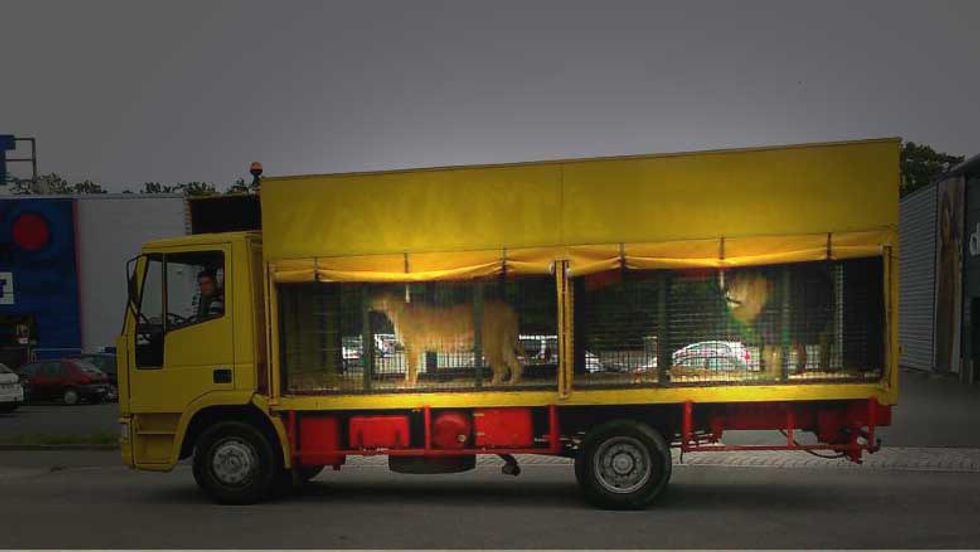The Truth Is...
The truth is, when I decided to write this article I had no idea what kind of emotions I was opening myself up to. Even just searching the phrase “circus animals” fills your monitor with the horror that is life for the caged and abused. The pit in my stomach was so grave, I couldn’t spend more than a minute or two browsing the images. I don’t think you have to be particularly fond of animals to be disturbed, either.
The truth is, there are more Tigers owned by Americans than left in the wild worldwide. That is truly awful and heartbreaking.The truth is, tigers, elephants, lions, and any other animal used to entertain a crowd does not jump through hoops, balance on pedestals or perform various other tricks because they want to; they do so because they are afraid of what will happen if they don't. Shocked with electric probes, hit with sharp steel hooks called bullhooks, or whipped, the life of a circus animal, who brings smiles and wonder to the mind of a child, is miserable. Circus animals are even sometimes drugged to make them more manageable, some even have their teeth removed to make them less dangerous while "training."
The truth is, tigers in the wild have territory which they roam spanning anywhere between seven to 40 square miles depending on gender, food supply and mating availability. Circus cats...well, they are confined to cages, trailers, sometimes even regular trucks with no windows or ventilation for days at a time. Most don't even have access to necessities or basic needs like water, food, and veterinary care. Big cats, like tigers, are imprisoned in cages where they eat, sleep, defecate, urinate and drink within a 35-square-foot space. Some might argue that once the circus arrives to its destination, animals are taken out to stretch their legs and get much-needed exercise, this is simply a fallacy. Once arriving at a venue, animals are kept chained in arena basements or caged in parking lots, there is never any freedom. Never any time or allowance to just be a tiger or elephant. And let's face it, where do you think they would let a tiger "stretch" it's legs? Through your local grocery store parking lot?
Reality, Shall We...
Let's face another reality, the reality that after years of abuse, neglect and just terrible conditions, it's not uncommon for circus animals to snap putting circus goes, handlers and those in surrounding areas in danger. Elephants go on rampages, tigers and zebras head for the open streets of heavily populated cities when the opportunity presents itself. Take Missouri in 2014, for example, when handlers lost control of three circus elephants. After trampling cars and causing destruction to other nearby structures, it took those same handlers 45 minutes to regain control of the animals and situation. The elephants were lucky to not have been brought down in a hail of gunfire and the handlers were lucky to escape without any casualties.
The sad part is many continue to blame the animals. "They should have been better trained," "they knew better," etc. No. They are wild animals. They were not and are not meant to be tamed and trained for our entertainment. We, as humans, a superior breed, are the ones that should know better. Should know that animals like those used in circus acts are not meant to be tamed, not meant to live a life in captivity. Captivity is not and will never be their natural habitat. Please don't live in a delusion that humans have it all figured out and an animal confined to a cage with food and water is better off than it's counterpart roaming free in their natural habitat; the wild. Please don't be that naive.
Banning The Use Of Animals in Circuses...
Thirty two countries around the world have introduced bans on the use of animals in circuses, including Scotland who most recently introduced legislation to ban the practice of using animals by May 2017. Below is a list of the other countries who already have bans in place.
- Austria
- Bolivia
- Bosnia and Herzegovina
- Colombia
- Costa Rica
- Croatia
- Cyprus
- El Salvador
- Greece
- Israel
- Malta
- Mexico
- The Netherlands
- Paraguay
- Peru
- Singapore
- Slovenia
Notice any countries that you thought might be included that aren't? You know, only the ones who are thought to be leading the way in technological, educational, and humanitarian advances. The top five countries in the world are nowhere to be found on this list. Come on Germany, Canada, United Kingdom, United States, and Sweden where's the love and compassion. Now is the time to listen to public outcry and stop forcing magnificent beings to perform ridiculous tricks. It's time to give them respect and some resemblance of a natural life.
For a country that has been called "the world's most dominant player in terms of economic and military might, and has left a significant cultural imprint in the part due to its entertainment industry" by U.S. News and World Report L/P, the US sure is slacking in using that impact to protect some of the world's most majestic and mistreated animals.
So What Can You Do?
First, and likely the most obvious answer is, STOP ATTENDING CIRCUSES THAT USE ANIMAL ACTS! The circus was recently in my hometown and I couldn't believe the number of friends who had purchased tickets without a thought to the safety of their children or the cruelty that goes on behind closed doors and away from the public eye.
Only after the death of 24 elephants in their direct care since 1992 has Ringling Bros & Barnum & Bailey Circus recognized the shift in public opinion regarding animal acts, and have stopped using elephants in their productions. However, they continue to use other wild animals such as tigers and lions in their shows, and even bears. Tigers that leap through hoops of flames only to sometimes get set on fire, or lions who spend 90 percent of their time chained in small carts while the other ten percent of their time is spent balancing on a small pedestal to please ticket purchasers. Eliminating elephant acts is a great step in the right direction, but we are far from ending the disaster that is circus abuse and as long as people purchase tickets, they'll be less inclined to make a change.
For other ways you can help and raise awareness, check out “Steps to Take When the Circus Comes to Town.“ You can also check out groups like Animal Defenders Internationals or ADI. They were created in 1990 and their missions is to "educate, create awareness, and promote the interest of humanity in the cause of justice, and the suppression of all forms of cruelty to animals; whenever possible, to alleviate suffering, and to conserve and protect animals and their environments."
If the images in this article upset you, I'm not sorry. They should. If you wouldn't want it done to yourself, how can you justify doing it to another living, breathing being? Animal abuse is alive and sadly well in today's society. That needs to change and the change can only start if you decided to take a stand. One person may not seem like enough, but it only takes one to turn into 10, 20, 100 and eventually millions. Don't be part of the problem, don't remain silent because silence fixes nothing, and silence can be deadly.






















